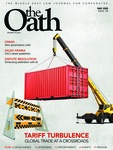News from the Courts – July/Aug 2015
1) Following the conclusion of a public consultation, the DIFC Courts announced a series of practical enhancements that will help businesses access justice more simply and cost effectively. The first sees the default jurisdiction of the Small Claims Tribunal (SCT) extended to cover all claims up to AED500,000 in value, regardless of the nature of the case. The move will benefit businesses by offering cheaper, faster and more discreet access to justice. The emphasis at SCT hearings, which are held in private with a presiding judge, is amicable dispute resolution and parties are usually not represented by lawyers. This reduces costs and expedites the process, with 90 per cent of cases before the DIFC Courts’ SCT settled within four weeks from the start of the case, without the need for a trial.
This also means that the Court of First Instance (CFI) will now hear cases greater than AED500,000 in value. The move was necessitated by the increasingly large and complex cases heard by the DIFC Courts and will free up the resources of the CFI and its judges. In 2014, the DIFC Courts received AED1.76 billion of claims, with the average claim amount in the CFI increasing by 25 per cent to AED42 million per case. DIFC Courts judges retain the right to send particularly technical cases which fall under the new SCT threshold to the CFI.
The second enhancement sees the introduction of a simplified schedule of DIFC Courts fees. Court users will now pay a streamlined sliding fee that includes the hearing fees for any in-chamber meetings, a Case Management Conference, a Pre-trial Review and up to three days of trial. This reduces the number of processes required, again enhancing efficiency. Moreover, the DIFC Courts have taken steps to reduce fees for claims at the lower end of the financial spectrum, while removing the USD250 fee for enforcing the DIFC Courts own judgments, and introducing a new reimbursement policy that encourages early settlement.
Following a successful soft launch, fees have also been finalised for the new Business Visit Visas service to support international legal counsel flying in to appear before the DIFC Courts. Arranging a Category A 30 or 90 day visa will cost USD550 for a two-day turnaround, while a Category B 30 day visa will be USD1,600 for the same turnaround time.
All the enhancements were put out to consultation in March 2015 for a period of one month. The DIFC Courts received a number of suggestions from the legal and business communities which have been adopted in the final drafts. Full details of all changes, including the new fees schedule, can be found on the DIFC Courts website www.difccourts.ae.
2) The heads of Dubai’s two courts, the Arabic language Dubai Courts and the English language DIFC Courts, met recently to discuss areas of shared interest, including the new Wills & Probate Registry and the Maktoum Bin Mohammed Al Maktoum Initiatives for Legal Excellence.

The meeting at the DIFC Courts further reinforced the close collaboration between the two courts for the benefit of those living, working and investing in Dubai. It also built on the memoranda signed between the courts, the joint judicial committee established in 2009, collaboration on events such as the International Association of Court Administration conference, which was held for the first time in the Middle East in 2013, and the working group between the courts established to develop complementary registries for the wills of non-Muslims.
Michael Hwang, Chief Justice of the DIFC Courts, welcomed HE Expert Tarish Al Mansouri, Director General of Dubai Courts. The two organisations are working closely together to support the UAE’s vision of making the country one of the best places in the world to do business by 2021.
The DIFC Wills and Probate Registry provides non-Muslim expatriates the ability to register English language wills that allow their Dubai assets to be transferred upon death according to their wishes. At the launch of the Registry it was also announced that Dubai Courts would be establishing a similar registry for Arabic language wills. During the meeting the two courts discussed how to further streamline the process of probate claims related to registered wills. They also considered potential new joint programmes as part of the Initiatives for Legal Excellence of His Highness Sheikh Maktoum Bin Mohammed Al Maktoum, deputy ruler of Dubai and chairman of the Dubai Judicial Council, and the formation of a joint operational committee to complement the current joint judicial committee.
HE Expert Tarish Al Mansouri, director general of Dubai Courts, highlighted the importance of cooperation and sharing best practice with the DIFC Courts to achieve justice, deliver international standards and support the UAE’s position on the global stage.

























































































































